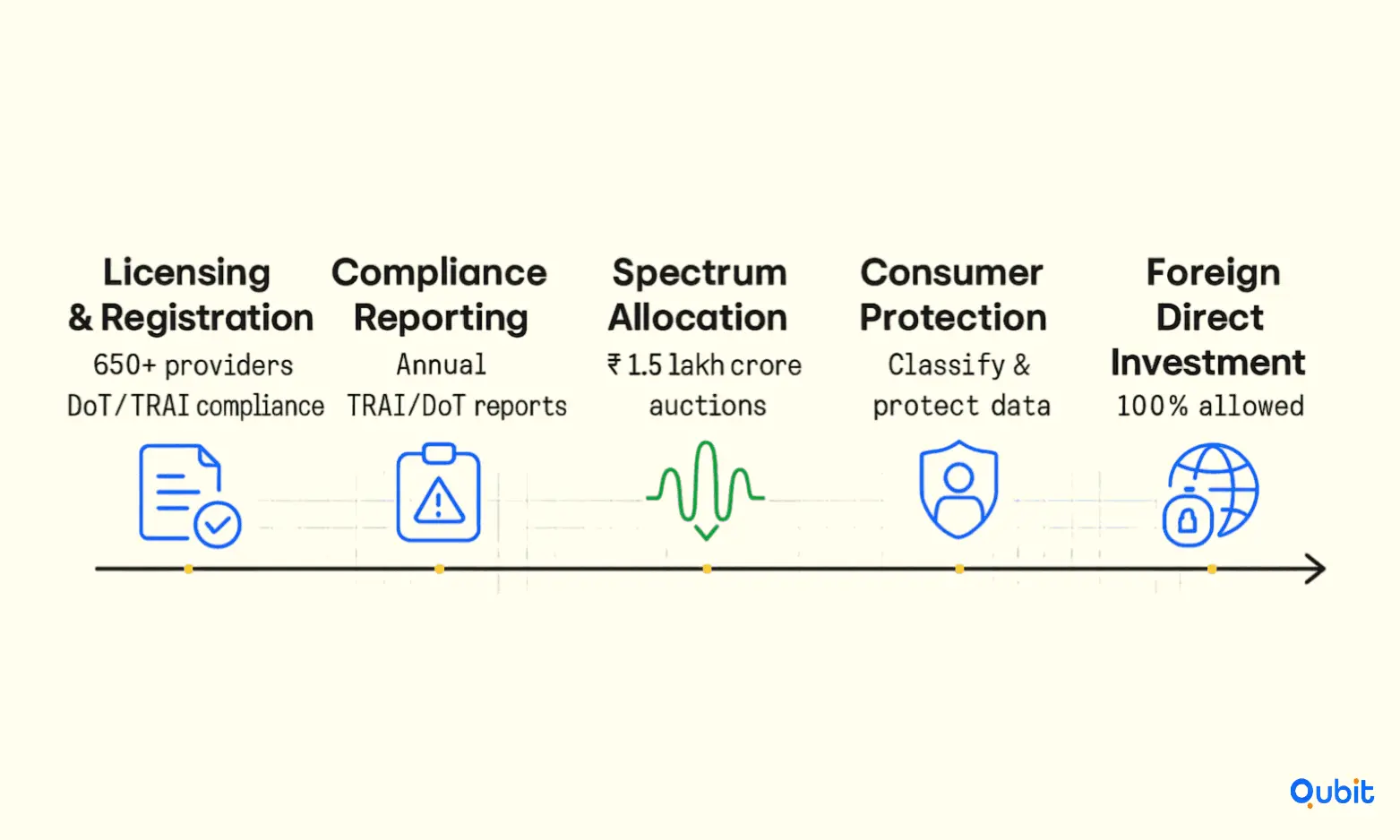The telecom sector stands at the intersection of innovation, infrastructure, and regulation. As startups and scale-ups race to deploy next-generation connectivity, secure funding, and expand across borders, legal and regulatory compliance is no longer a box to check, it’s a critical success factor. In 2025, with anti-money laundering (AML) laws tightening, transparency rules expanding, and cross-border fundraising growing, telecom founders must navigate an increasingly complex legal landscape to win investor trust and avoid costly pitfalls.
This article explores the essential legal and regulatory issues in telecom fundraising, from government grants and FDI compliance to AML, ownership disclosure, and due diligence.
What Is Regulatory Compliance?
Regulatory compliance refers to the process by which businesses ensure they are operating in accordance with all applicable laws, regulations, standards, and policies set by government authorities and regulatory bodies. For telecom startups and companies, this means adhering not only to general business laws, such as company registration, tax, and labor regulations, but also to sector-specific rules that govern telecommunications, data privacy, security, and service quality.
Why Legal & Regulatory Compliance Matters in Telecom Fundraising
Telecom is one of the most regulated industries worldwide, reflecting its role in national security, critical infrastructure, and data privacy. Fundraising in this sector, whether through equity, debt, grants, or alternative models, triggers a host of legal requirements:
- Investor due diligence and KYC/AML checks
- Ownership transparency and reporting
- Cross-border capital controls and FDI rules
- Sector-specific licensing and operational approvals
- Ongoing compliance and monitoring obligations
Ignoring these requirements can lead to funding delays, fines, or even criminal penalties. On the flip side, startups that prioritize compliance early build investor confidence, streamline fundraising, and position themselves for sustainable growth. For a comprehensive overview of telecom funding strategies, see How to Secure Funding for Telecom Startups: Strategies and Insights.
Key Legal and Regulatory Challenges in 2025
1. Anti-Money Laundering (AML) and KYC
Why it matters:
New AML laws in 2025 demand that startups implement robust systems to verify the identity of investors, monitor transactions, and report suspicious activity. The Financial Action Task Force (FATF) now requires risk-based compliance, tailored to each startup’s market, customer base, and funding model.
What’s new:
- Ownership transparency: The Corporate Transparency Act (CTA) mandates detailed reporting of beneficial owners (those holding 25%+ or significant control), with strict deadlines and steep penalties for non-compliance.
- Reverse due diligence: Startups must vet investors as carefully as investors vet startups, ensuring funds are legitimate and not from sanctioned entities.
- Digital asset oversight: Startups dealing in crypto or DeFi face even stricter tracking and reporting requirements.
Practical steps:
- Build KYC/AML checks into your fundraising process.
- Maintain detailed records of all investors and transactions.
- Budget for legal and compliance costs—these are now ongoing, not one-off.
2. FDI and Cross-Border Capital Controls
Why it matters:
Telecom is a strategic sector in many countries, subject to foreign direct investment (FDI) caps, pre-approval requirements, and sector-specific restrictions. Fundraising from overseas investors may trigger additional reporting and compliance steps.
What’s new:
- FEMA and RBI rules in India: Startups must report FDI inflows, comply with sectoral caps, and obtain government approval for sensitive deals.
- EU and US rules: Increasing scrutiny on foreign investments in critical infrastructure, especially from non-allied countries.
Practical steps:
- Consult legal experts before accepting foreign capital.
- File required reports with central banks and regulators.
- Structure deals to comply with sectoral limits and avoid delays.
3. Private Placement, Rights Issues, and Preferential Allotments
Why it matters:
Most telecom fundraising happens via private placements, rights issues, or preferential allotments. Each route has its own compliance requirements under company law, securities regulations, and sectoral guidelines.
What’s new:
- Preferential allotment: Issuing shares to select investors requires board approval, shareholder resolutions, and regulatory filings.
- Rights issues: Offering shares to existing shareholders must follow strict timelines and disclosure norms.
Practical steps:
- Prepare and file all required resolutions and disclosures.
- Maintain a clear audit trail of all fundraising activities.
- Use legal counsel to draft and review investment agreements.
4. Government Grants and Public Funding
Why it matters:
Government funding (e.g., NTIA broadband grants) comes with its own set of legal conditions, from demonstrating service to underserved areas to meeting sustainability and reporting requirements.
What’s new:
- Sustainability and ESG: Many grants now require proof of environmental stewardship and social impact.
- Ongoing audits: Recipients face regular compliance checks and must maintain transparent financial records.
Practical steps:
- Align projects with grant criteria and document impact.
- Prepare for audits and reporting obligations.
- Build compliance into your operational and financial systems.
5. Right of Way and Infrastructure Approvals
Why it matters:
Deploying telecom infrastructure (towers, fiber, small cells) requires right of way (RoW) clearances and compliance with local zoning and environmental laws.
What’s new:
- Telecommunications Act, 2023 (India): New RoW rules streamline approvals but require detailed documentation and adherence to environmental norms.
- Smart city and public-private projects: Often involve complex, multi-agency approvals.
Practical steps:
- Engage with local authorities early.
- Prepare comprehensive documentation for RoW and environmental clearances.
- Monitor regulatory changes that may affect project timelines.
The Regulatory Landscape in Indian Telecom

- Licensing and Registration: As of 2025, India has over 650 licensed telecom service providers, including Unified License holders, ISPs, and VNOs, all of whom must comply with DoT and TRAI regulations.
- Compliance Reporting: Every licensed telecom operator is required to file annual compliance reports with TRAI and DoT, covering operational, financial, and technical aspects. Non-compliance can result in penalties ranging from ₹1 lakh to several crores, depending on the nature and severity of the violation.
- Spectrum Allocation: The government’s spectrum auctions have raised over ₹6.5 lakh crore in the last decade, with strict compliance requirements for spectrum usage and payment schedules.
- Tax Compliance: Telecom is one of India’s highest tax-contributing sectors, accounting for over ₹1.5 lakh crore in annual GST and other taxes. All operators must register for GST and adhere to direct tax requirements, including TDS and tax audits.
- Consumer Protection: TRAI receives over 10,000 consumer complaints per month, and operators are required to maintain transparent billing, redressal mechanisms, and DND (Do Not Disturb) compliance.
- Data Security: With the implementation of new data privacy laws, telecom companies must classify and protect sensitive data, and failure to comply can result in fines up to 4% of annual turnover under proposed regulations.
- Foreign Direct Investment (FDI): The telecom sector allows 100% FDI (up to 49% via the automatic route), making compliance with FDI norms and documentation crucial for startups seeking international capital
Sector-Specific Licensing and Regulatory Approvals
Telecom startups must secure the appropriate licenses before raising or deploying significant capital:
- Unified License (UL): Required from the Department of Telecommunications (DoT) to provide telecom services.
- ISP License: For internet service providers.
- VNO License: For virtual network operators.
- Infrastructure Provider (IP-I/IP-II) Registration: For those building telecom infrastructure.
- Spectrum Allocation: For businesses needing spectrum (e.g., mobile network operators).
- TRAI Registration: All telecom operators must register with the Telecom Regulatory Authority of India (TRAI) for regulatory oversight and ongoing compliance.
Compliance with licensing conditions, including performance and financial bank guarantees, is mandatory.
Best Practices for Legal Compliance in Telecom Fundraising
1. Start Early and Plan Ahead
Legal compliance is not a last-minute task. Begin your fundraising journey with a compliance checklist, allocate budget for legal advisors, and update your processes as regulations evolve.
2. Build a Robust Data Room
Investors and regulators will want to review your corporate documents, cap table, compliance records, and funding agreements. A well-organized data room saves time and builds trust.
3. Emphasize Transparency
Disclose all beneficial owners, funding sources, and material risks. Transparent communication reassures both investors and regulators, reducing the risk of future disputes or penalties.
4. Adapt to Local and Global Rules
If you’re raising funds across borders, tailor your compliance approach to each jurisdiction—what works in the US may not suffice in India or the EU.
5. Monitor and Report Continuously
Compliance is ongoing. Implement systems for real-time monitoring, regular audits, and timely reporting of ownership or funding changes.
Conclusion
Legal and regulatory compliance is no longer optional for telecom startups seeking funding in 2025, it’s a strategic imperative. From AML and ownership disclosure to FDI and government grant requirements, founders must navigate a complex web of rules that shape every stage of their fundraising journey. By prioritizing compliance, building transparent systems, and adapting to evolving regulations, startups can unlock capital, build investor trust, and scale with confidence in a rapidly changing industry.
Ready to take the next step? Use our fundraising assistance to map out a clear strategy and build a strong legal backbone for your startup and tap into the right funding sources.
Key Takeaways
- Legal and regulatory compliance is critical for telecom fundraising in 2025, affecting everything from investor trust to funding timelines.
- New AML and KYC laws demand detailed ownership disclosure, investor vetting, and ongoing monitoring.
- FDI and cross-border fundraising require careful structuring and reporting to comply with national security and sectoral rules.
- Private placements, rights issues, and government grants all come with specific legal procedures and documentation requirements.
- Startups that prioritize compliance early build investor confidence, avoid penalties, and position themselves for sustainable growth.
Frequently asked Questions
What is the Corporate Transparency Act and how does it affect telecom fundraising?
The CTA requires startups to disclose detailed information about beneficial owners (25%+ ownership or significant control) to regulators. Fundraising activities that change ownership structures must be reported within 30 days, with steep penalties for non-compliance.


 Back
Back



